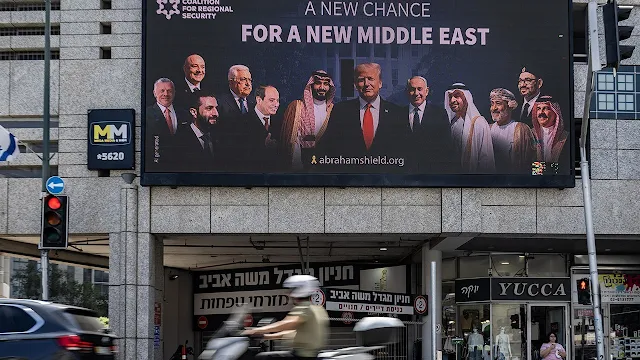Israel expresses willingness normalization with Arab states, Israel sought to kill Iran’s Khamenei during war
This victory opens the path to dramatically enlarge the peace accords.”
Netanyahu appeared to reference the Abraham Accords, the U.S.-brokered deals that normalized Israel’s relations with the UAE, Bahrain, and Morocco. He stressed that, alongside efforts to free Israeli hostages in Gaza and defeat Hamas, there is now “a window of opportunity” for broader peace deals. “We must not miss it. We must not lose a single day,” he said.
The Abraham Accords were first reached in 2020 under former U.S. President Donald Trump. Since then, Saudi Arabia has also explored normalizing ties with Israel.
Following the ceasefire with Iran, a controversial billboard appeared in central Tel Aviv, showing Netanyahu, Trump, and leaders of Arab countries without formal ties to Israel—including Saudi Arabia, Syria, Oman, and Lebanon—alongside Palestinian President Mahmoud Abbas. The billboard, commissioned by the “Regional Security Coalition,” read: “A New Chance for a New Middle East,” and featured leaders from nations that already normalized relations under the Abraham Accords.
U.S. envoy Steve Witkoff recently indicated that Washington would soon announce updates on additional countries expected to join the accords, saying, “We expect normalization from many countries.”
According to Israel Hayom, Netanyahu and Trump allegedly reached a verbal agreement to end the war in Gaza within two weeks, in exchange for normalization deals with countries like Saudi Arabia and Syria. As part of the reported deal, Israel would support a conditional two-state solution, and the U.S. would recognize Israeli sovereignty over parts of the occupied West Bank.
Israel admits it sought to kill Iran’s Khamenei during war
Meanwhile, Iran’s Supreme Leader Ayatollah Ali Khamenei appeared publicly for the first time since the war’s end, seeking to prove he is alive and in command. However, analysts noted he looked frail and sounded hoarse in the recorded video, which was filmed against a plain backdrop rather than before an audience—fueling speculation he may still be in hiding due to Israeli threats.
 |
Israel admits it sought to kill Iran’s Khamenei during war |
Despite this, Iran’s ruling system survived the conflict. Still, Israel demonstrated both military dominance and intelligence capabilities by eliminating key figures in Khamenei’s inner circle.
Khamenei, 86, has ruled Iran since 1989 but is seen as increasingly vulnerable. Analysts point to setbacks including weakened allied groups Hamas and Hezbollah, the collapse of Bashar al-Assad’s government in Syria, and Iran’s deepening economic crisis.
Thomas Juneau, a professor at the University of Ottawa, said Khamenei’s authority has been “undermined” by recent events, even if his position remains secure in the short term.
Arash Azizi, a visiting fellow at Boston University, described Khamenei in his address as “frail and weak,” a stark contrast to his once-powerful persona. “Power in Tehran is already shifting to different factions, and the battle for his succession will only intensify,” Azizi said.
Khamenei has previously weathered crises, including the violent crackdown on protests following the death of Mahsa Amini in 2022. But new reports suggest he spent the recent war in hiding, avoiding digital communications to prevent detection, and was possibly excluded from ceasefire negotiations—though these claims have not been confirmed.
Jason Brodsky, policy director at United Against Nuclear Iran, noted Khamenei appeared “frail and hoarse,” but cautioned against concluding he has been sidelined. “In the end, the buck has always stopped with Khamenei,” he said, predicting fierce internal debates in Iran over rebuilding its military and intelligence networks.









No comments
Thanks for viewing, your comments are appreciated.
Disclaimer: Comments on this blog are NOT posted by Olomo TIMES, Readers are SOLELY responsible for their comments.
Need to contact us for gossips, news reports, adverts or anything?
Email us on; olomoinfo@gmail.com